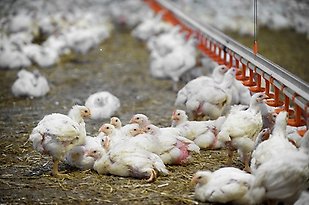Uppsala and AMR: Advanced Research, Action and Awareness!

In Uppsala there are two leading academic institutions with internationally competitive research: Uppsala University and the Swedish University of Agricultural Sciences. The activities of the two universities, along with our other Uppsala-based, not-for-profit partners behind Uppsala Health Summit, have created a hub for multi-disciplinary research, practice and advocacy on antimicrobial resistance.
Uppsala University is home to the Uppsala Antibiotic Center, (UAC) which brings together, stimulates and supports important research on antibiotic resistance from all three disciplinary domains at Uppsala University: Medicine and Pharmacy, Science and Technology, and Humanities and Social Sciences.

Beyond supporting research and education, once a month the UAC publishes a new episode of The AMR studio; a podcast dedicated to highlighting the multidisciplinary research on antimicrobial resistance that is happening around the world. Tune in and learn anything from the history, law or ethics of AMR to the latest alternative treatments!
Among Uppsala University’s research contributions of potentially great clinical importance are the advances within rapid testing - diagnostics that are able to diagnose the type of infection quickly and thus, determine effective treatment within hours, - much faster than the current method of choice used in clinics today.
Uppsala University is also involved - as one of four academic partners - in COMBINE – an Innovative Medicine Initiative (IMI) which contributes to the development of a pipeline for new medicines to treat or prevent resistant bacterial infections.
PLATINEA is a multi-sectoral platform, also run from Uppsala University, working on making sure that important antibiotics are preserved and available on the market when they are needed, through continuous dialogue and implementation of solutions.
Uppsala University is the proud host of the international network, ReACt –which has its European office in our city. ReAct is an independent network and a global catalyst, advocating and stimulating global and multisector engagement on antibiotic resistance by collaborating with a broad range of organizations, individuals and stakeholders.

The Swedish University of Agricultural Sciences is a major player in the field of AMR in the world through partnerships with the FAO, the World Organisation for animal health (OIE) and the World Bank.
Across different departments, and through collaboration between scientists nationally and internationally, SLU contribute new knowledge and trainings within antimicrobial prudence and stewardship, prevention of infectious disease, and One Health. Notably, the Livestock Antimicrobial Partnership, LAMP - an Action Network within the Global Agenda for Sustainable Livestock - has its secretariat at SLU Global in Uppsala.
Currently, SLU coordinates two high profile international research projects focused on reducing the use of antibiotics in livestock from the EU programme JPIAMR: one led by Professor Ulf Magnusson (Programme Committee Chair for Uppsala Health Summit 2021) in Thailand and one led by Professor Susanna Sternberg Lewerin.
The Swedish Medical Products Agency is a partner in Uppsala Health Summit and has its headquarters in Uppsala. With its aim to provide access to safe and effective medicines, the agency has a broad responsibility in the pharmaceutical field that is directly or indirectly important for work against antimicrobial resistance. The agency's main focus is on the availability and proper use of antimicrobial drugs, and the limitation of the environmental impact of antimicrobials in the development, manufacture and use.
The National Veterinary Institute, SVA, is heavily involved in different aspects of reducing drug resistance, such as educating livestock producers and the public as well as surveilling the presence of resistant pathogens in animals and the environment. SVA is the reference laboratorium for AMR in animals and food in Sweden, and guides other laboratories in testing procedures and interpretation of results. In society, the consumption/use of antibiotics is the most important driver of AMR and this is followed on a continuous basis by SVA. In order to understand the underlying mechanisms of AMR research is conducted in, for instance, the areas of resistance mechanisms and resistance epidemiology, but also on the effectiveness of use of antibiotics in different disease conditions in animals. All activities are performed with a One Health approach, taking into account aspects from both the human, animal and environmental perspectives.
Uppsala Health Summit Partner Uppsala Monitoring Centre (UMC) is an independent centre, collaborating with the WHO, and working to make medicines safer in all parts of the world. UMC’s contribution to reducing AMR involves producing communication materials about safe use of medicines and providing technical assistance to governments on monitoring for poor quality medicines that drives resistance. Read more about the role of Pharmacovigilance in combatting AMR in Uppsala Reports, Issue 74 (2017).
Join us
All this impressive knowledge, learning, and international networking, makes us well placed to discuss how to put research results into practice! Welcome to Uppsala Health Summit on Antimicrobial Resistance and Behaviour Change!
